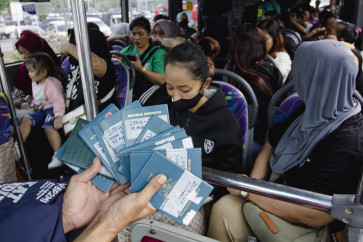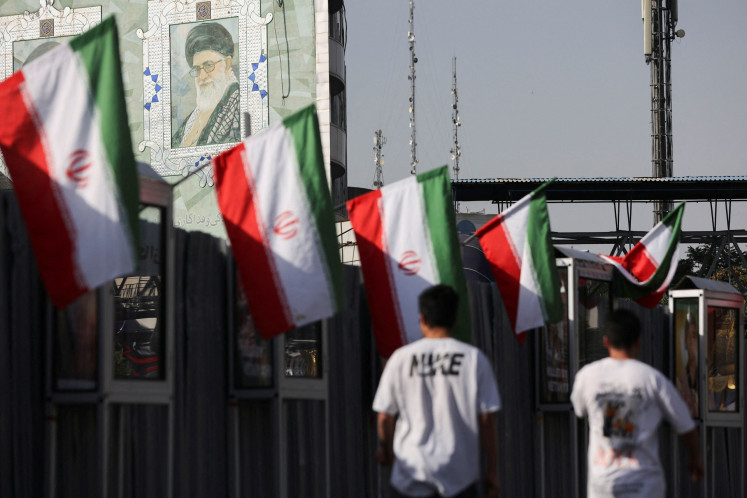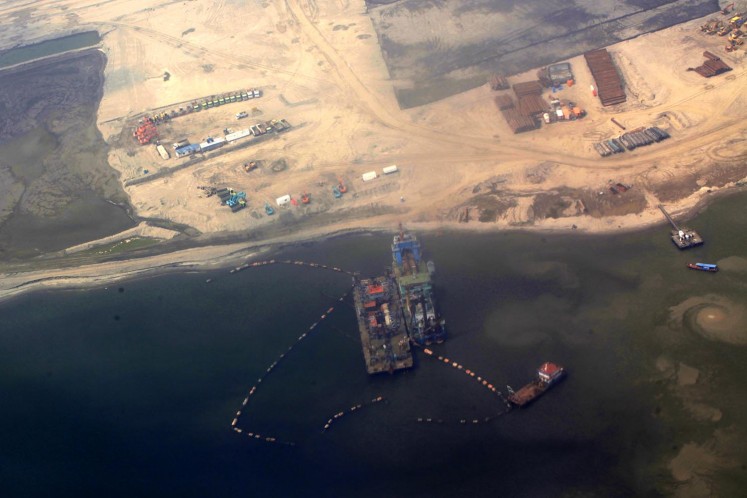Popular Reads
Top Results
Can't find what you're looking for?
View all search resultsPopular Reads
Top Results
Can't find what you're looking for?
View all search resultsHumans, animals bond in West Jakarta shelter
Deep in the capital’s suburbs, in Kalideres, West Jakarta, lies the Tegal Alur Animal Rescue Center
Change text size
Gift Premium Articles
to Anyone

D
eep in the capital’s suburbs, in Kalideres, West Jakarta, lies the Tegal Alur Animal Rescue Center.
The transit shelter, which employs nine keepers, is a temporary home for more than 200 animals.
With the keepers engage in a daily routine of feeding the animals and cleaning their and feeding them, a special bond between human and animal develops, a keeper said.
The coordinator of the center, Jemy Piter Karubun, who is fondly known as Jack, recalled the most impressive memory of his six years working in the shelter: his parting from an orangutan.
An orangutan named Jono had been living in the transit shelter for six years, just before Jack joined the institution. He had previously been kept as a pet on a private property, despite the fact that orangutans are an endangered species.
In April this year, Jono was translocated to Pangkalan Bun in Kalimantan so he could undergo rehabilitation prior to being released into the wild.
“We [the keepers] were very sad. When we accompanied Jono to Kalimantan, we were unwilling to go back,” he told The Jakarta Post on Tuesday.
The transit shelter was established in 1999 by the Gibbon Foundation to shelter animals that were stolen, confiscated by authorities, rescued from disasters, involved in conflicts with humans and even voluntarily handed over by people. The Jakarta Natural Resources Conservation Agency (BKSDA) took over its management in 2006.
The place is mainly filled with birds like eagles, cockatoos and peacocks, or other animals like saltwater crocodiles, sea turtles, wildcats, gibbons, langur and bears. However, the number and types of animals in the shelter often vary because it receives and relocates animals in staggered time frames.
Jack formed a similar special bond with a 2.3-meter saltwater crocodile named Bella.
Bella had been a pet on private property in South Tangerang, Banten, for four years when she escaped during a flood in April.
Jack said Bella hid underwater in a private pond when a rescue team arrived, but she immediately surfaced when a woman, supposedly her owner, came to help.
“Bella flapped its tail when the woman approached, indicating that the crocodile was fond of her,” he recalled. “It was sad seeing their separation, but it had to be done,” Jack said.
Bella no longer stays at the shelter. She was translocated to the Cikananga Animal Rescue Center in Sukabumi, West Java, on Dec. 6, along with 10 other saltwater crocodiles.
The head of the BKSDA’s Jakarta chapter, Ahmad Munawir, told reporters last week that the Tegal Alur shelter, which is built on a 2,850-square-meter plot of land, did not have enough space to shelter 26 crocodiles, as the pond inside it was only 80 sq m in size.
“Cikananga has larger ponds and a better rehabilitation program,” Ahmad said.
All the translocated crocodiles, aged at most four years, were voluntarily handed in by people of the Greater Jakarta area.
“Information about saltwater crocodiles, a protected species, has spread thanks to the press and public. This might be the reason for the people handing them over to us,” he said.
Ahmad said the animal owners might have been overwhelmed by the maintenance cost of nurturing protected animals as they grew bigger and required more space. (sau)









